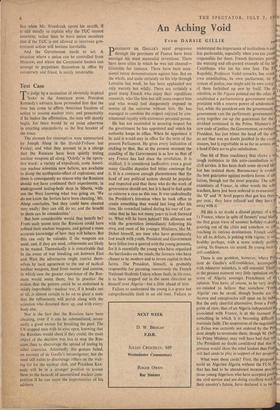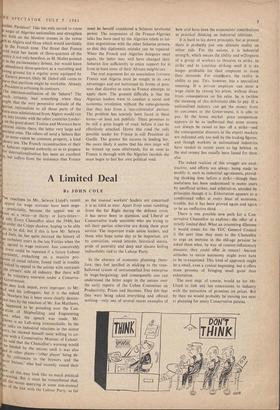An Aching Void
From DARSIE GILLIE cl pRESIDENT DE GAULLE'S royal progresses through the provinces of France have been amongst his most successful inventions. There have been cities in which he was not cheered— Grenoble for instance. There have been occa- sional minor demonstrations against him. But on the whole, and quite certainly on his trip through Lorraine last week, he has been applauded not only warmly but wildly. There are certainly a great many French who enjoy their republican monarch, who like him but still more respect him and who would feel dangerously exposed to storms of the universe without him. He has managed to combine the respect enjoyed by con- stitutional royalty with enormous personal power.
He has not succeeded in securing respect for the government he has appointed and which his authority keeps in office. When he appointed it he said it would stay in office for the term of the present Parliament. He gives every indication of sticking to that. But at the present moment the standing of the Government is as low as that of any France has had since the revolution. It is disliked; it is considered ineffective; even a great many Gaullist deputies feel bitter contempt for it. It is a common enough phenomenon that tbe head of any political system should be popular and respected and that those who do the work of government should not, but it is hard to find quite so extreme a case as this one. It was undoubtedly the President's intention when he took office to create something that would last long after his time. He remarked indeed during his tour of Lor- raine that he has not many years to look forward to. What will he leave behind? His alliances are with the generation immediately following his own, and most of his younger Ministers, like M. Debre himself, are men who have prematurely lost touch with youth. President and Government have fallen into a quarrel with the young peasants, for it is essentially the young who have organised the barricades on the roads, the farmers who have chosen to be modern and to invest capital in their farms. The President, himself, is probably responsible for pursuing rancorously the French National Students Union whose fault, in his eyes, is to have stepped out in the same direction as himself over Algeria—but a little ahead of him.
Failure to understand the young is a grave but comprehensible fault in an old man. Failure to
understand the importance of institutions is so less pardonable, especially when you are you responsible for them. French literature pros/ the warning and oft-quoted example of the Catoblepas who ate his own feet. The F.
Republic, Professor Vedel remarks, has e.:.4 ten,
1 own constitution, its own parliament, its system of justice, one might add its own rmy, f
of them furbished up new by itself. The , stitution, as the Figaro pointed out the other dtei
r
established a parliamentary government undelotl president with a reserve power of arbitration. 'tit!, fact, while the president eats the government. tfLi-1, government eats the parliament; government a,eil army together eat up the guarantees for the dividual contained in the Prime Minister's O. new code of justice; the Government, or rather dip, President, has just bitten the head off the ar an act that was no doubt justified in the c ircu d stances, but is regrettable in so far as armic,, vti a head if they are to give satisfaction. I c One bit of State machinery that shows a vo.ta tough resistance to this auto-cannibalism is 11 civil service. It has been dealt some shrewd bloll but has resisted them. Bureaucracy is rroba the best guarantee against modern forms .f a intim, though not the most popular. The sch examiners of France, in other words the sch teachers, have just been ordered to re-examine the '0' and 'A' level papers that got less than per cent.; they have refused and they have • away with it.
All this is no doubt a dismal picture of a s 1:t France, where in spite of farmers' road blo the first great wave of summer holiday-m*1(mi pouring out of the cities and somehow or ot reaching its various destinations. French NOC for all its defects, is pulsing with vigour, is 111. healthy perhaps, with a more orderly polin casing. Its finances are sound. Its young men
self-confident. ve There is one problem, however, where Pr dent de Gaulle's self-confidence, accompanl, I
ith whatever mistakes, is still essential. There th at the present moment very little optimism on ei score of Algeria amongst Frenchmen of opinion. You have, of course, to be very des hi ate-minded to believe that somehow 'Fre yi Algeria' can be saved, though bombs are Srh thrown and conspiracies still spun on its bell3litc But the only cheerful alternative, from a Frac() point of view, that of an Algeria independent Oer a associated with France, is at the moment el'or something in which it is becoming difficult inh maintain faith. The suspension of the negotiatie nt at Evian was certainly not ordered by the P st dent simply to terminate them, though M. Deb Li his Prime Minister, may well have had that va h The President no doubt considered that this i s pension would show the rebel leaders that Frail still had cards to play in support of her propos What were these cards? First, the proposal ac build an Algerian Algeria without the FIN. .13 that has had to be abandoned because prem those young Algerians who have accepted poslqit. the civil service and are doing excellent work I all their country's future, have declared it to be I
II
Ii
ic
se ssible. Partition? This has only served to rouse anger of Algerian nationalists and strengthen eir hold on the Moslem masses in the towns ch as Algiers and Oran which would inevitably in the French zone. The threat that France uld wash her hands of three-quarters of the untry is not only heartless, as M. Mollet pointed t in the parliamentary 'debate, but would leave abandoned three-quarters as a recruiting and ining ground for a regular army equipped by Eastern powers. Only M. Debre still seems to lieve that partition might be workable. Already President is softening its contours. The internationalisation of the Sahara? The eneh certainly had something when they tight that the very possessive attitude of the gerian nationalists to all those parts of the ara once administered from Algiers would run m into trouble with the other countries border- on the great desert. Tunisia and Morocco have ritorial claims there, the latter very large and portant ones. The others all need a Sahara that to some extent be common property, a kind desert sea. The French reconstruction of their vn Saharan regional authority so as ,t o prepare , for internationalisation has been an excellent lea, but suffers from the insistence that France must be herself considered a Saharan territorial power. The suspension of the Franco-Algerian talks has been used by the Algerian rebels to ini- tiate negotiations with the other Saharan powers, so that this diplomatic mistake can be repaired. When the French and Algerian delegates meet again, the latter may well have changed their Saharan line sufficiently to enjoy support for it from at least some of their African neighbours.
The real argument for an association between France and Algeria must be sought in its own advantages and not buttressed by forms of pres- sure that dissolve as soon as France attempts to apply them. The greatest difficulty is that the Algerian leaders want to conduct a social and economic revolution without the entanglements that they fear from a 'neo-colonialist' partner. The problem has scarcely been faced in these terms—at least not publicly. There promises to be still a grim length of road, before it can be effectively attacked. Down this road the only possible leader for France is still President de Gaulle. The greater his success in leading her, the more likely it seems that his own reign will be wound up soon afterwards, for as soon as France is through with the Algerian incubus she must begin to feel her own political void.



























































 Previous page
Previous page